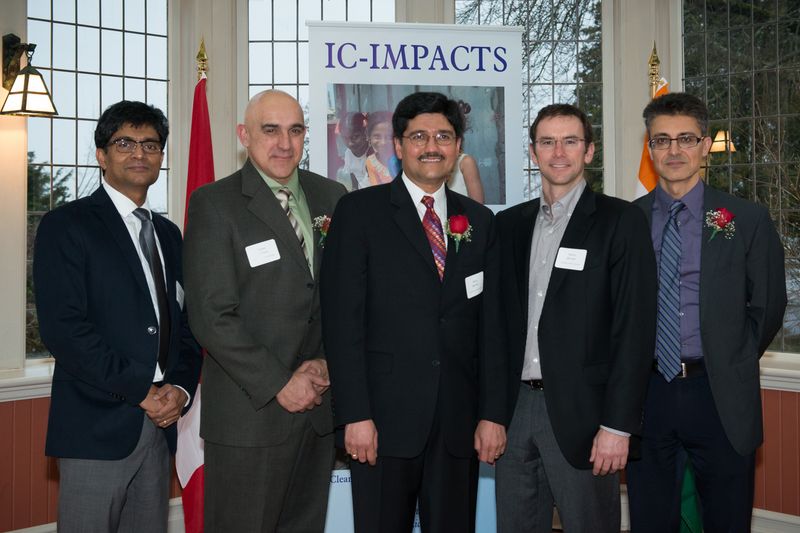Researchers from the University of British Columbia, University of Alberta, University of Toronto and 11 leading institutions in India have joined forces in a $30 million partnership to tackle urgent issues in both countries.
Supported by the Canadian government and state and industry partners in India, the India-Canada Centre for Innovative Multidisciplinary Partnerships to Accelerate Community Transformation and Sustainability (IC-IMPACTS) focuses on three key areas: safe drinking water, reliable infrastructure and effective prevention and treatment of water-borne and infectious diseases. The partnership will support new technology spinoffs and the training of more than 700 students and researchers.
Through the development, deployment and commercialization of new technologies, and the training and exchange of students and researchers, IC-IMPACTS is expected to generate economic benefits for both nations while building research capacity and solving issues of importance to both countries. Prime Minister Stephen Harper announced the partnership in November of 2012 while in New Delhi.
“Collectively, UBC, U of A and U of T have an impressive track record of international research collaboration in India that brings about tangible changes to communities. This partnership, unprecedented in scale, will allow us to find — and apply — solutions to some of the most pressing issues in both Canadian and Indian communities,” says Professor Stephen Toope, UBC President.
Hosted at UBC, the partnership was spearheaded by IC-IMPACTS’ Scientific Director and Civil Engineering Professor Nemkumar Banthia. Dr. Banthia oversees the Sustainable and Safe Infrastructure research program, which will develop new tools to assess the condition of aging concrete structures; develop low-cost, concrete-based building materials reinforced with fibre from agricultural waste; and devise low-cost strategies for strengthening structures against earthquakes. From UBC, Civil Engineering Professors Carlos Ventura and Dharma Wijewickreme will join forces with the teams.
A signature strategy of IC-IMPACTS is to demonstrate technologies in selected partner communities in Canada and India. In India, Banga (in Punjab), Nagpur (in Maharashtra) and the Roorkee (in Uttarakhand) were selected to participate. These cities range in population from 20,000 to 5 million and face challenges that collectively represent broader societal challenges in India.For example, Banga and Nagpur rely strongly on thermal power plants, producing large quantities of fly-ash waste. IC-IMPACTS researchers will investigate the feasibility of using fly-ash as a cement replacement for new constructions. Agricultural waste and natural fibres such as cotton arealso plentiful in these communities, allowing researchers to explore using natural fibres to reinforce nonstructural building materials such as roofing, siding and flooring. Nagpur and Roorkee are both in seismically active zones, and their civil infrastructure has badly deteriorated. IC-IMPACTS researchers will assess, monitor and devise a strategy for strengthening buildings, bridges, dams and power plants.Similar challenges exist in these communities in the areas of water management and disease prevention. In Canada, IC-IMPACTS will work with Pangnirtung, Nunavut; LyttonCreek First Nations, British Columbia; Thorsby, Alberta; and the Munsee-Delaware Community, Ontario.
The Integrated Water Management research program, led by U of A Mechanical Engineering Professor Sushanta Mitra, will develop, test and implement new technologies to monitor water quality and treat potable and waste water. In this case, the Network will draw upon the expertise of Professor Pierre Bérubé of UBC Civil Engineering. The Public Health Disease Prevention and Treatment research program, led by U of T Pharmacy Professor Lakshmi Kotra, will monitor drug resistance to malaria and fungal infections and develop new treatments to control the spread of resistance in infectious diseases. Application of public health strategies will be led by researchers from Public Health Ontario and UBC School of Nursing Professor Susan Dahinten, in collaboration with the Public Health Foundation of India, Guru Nanak College of Nursing, and Baba Farid University of Health Sciences.The $30 million IC-IMPACTS is supported by a $13.8 million grant from the Canadian government’s Networks of Centres of Excellence (NCE) Program. The Canadian universities will invest $3.75 million; Indian institutions, nearly $4 million; and the Indian State of Gujarat, $3 million. The remaining contributions come from Public Health Ontario, the Public Health Foundation of India, and other non-profit and industry partners. Notable industrial partners in India include Reliance Industries Ltd., Golder Associates, Kryton International Inc., Lars Enviro Pvt. Ltd., Lifecare Innovations Pvt. Ltd., Pultrall Inc., Robonik India Pvt. Ltd., Sensor Technology, Stantec, Starmass Environment Technologies, Stewols India (P) Ltd., Vector Corrosion Technologies and Tata Consultancy Services.
